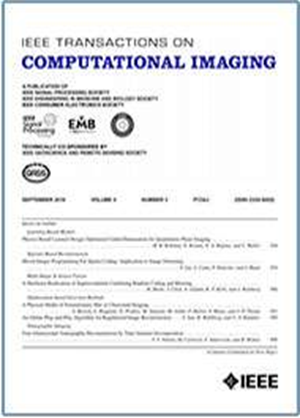Towards Single-Lens Controllable Depth-of-Field Imaging via Depth-Aware Point Spread Functions
IF 4.8
2区 计算机科学
Q2 ENGINEERING, ELECTRICAL & ELECTRONIC
引用次数: 0
Abstract
Controllable Depth-of-Field (DoF) imaging commonly produces amazing visual effects based on heavy and expensive high-end lenses. However, confronted with the increasing demand for mobile scenarios, it is desirable to achieve a lightweight solution with Minimalist Optical Systems (MOS). This work centers around two major limitations of MOS, i.e., the severe optical aberrations and uncontrollable DoF, for achieving single-lens controllable DoF imaging via computational methods. A Depth-aware Controllable DoF Imaging (DCDI) framework is proposed equipped with All-in-Focus (AiF) aberration correction and monocular depth estimation, where the recovered image and corresponding depth map are utilized to produce imaging results under diverse DoFs of any high-end lens via patch-wise convolution. To address the depth-varying optical degradation, we introduce a Depth-aware Degradation-adaptive Training (DA基于深度感知点扩展函数的单镜头可控景深成像研究
可控景深(DoF)成像通常基于笨重和昂贵的高端镜头产生惊人的视觉效果。然而,面对日益增长的移动场景需求,人们希望通过极简光学系统(minimal Optical Systems, MOS)实现轻量化解决方案。本文围绕MOS的两个主要局限性,即严重的光学像差和不可控的DoF,通过计算方法实现单镜头可控的DoF成像。提出了一种深度感知可控DoF成像(DCDI)框架,该框架具有全焦(AiF)像差校正和单目深度估计功能,利用恢复图像和相应的深度图,通过斑块卷积得到任意高端镜头在不同DoF下的成像结果。为了解决深度变化的光学退化问题,我们引入了一种深度感知的退化自适应训练(DA $^{2}$T)方案。在数据集层面,通过模拟不同目标距离下的点扩散函数(psf),建立了深度感知像差MOS (DAMOS)数据集。此外,我们设计了两个即插即用的深度感知机制,将深度信息嵌入到像差图像恢复中,以更好地解决深度感知退化问题。此外,我们提出了一个存储效率高的全镜头场模型来表示各种镜头的4D PSF库。利用预测的深度图、恢复的图像以及由Omni-Lens-Field推断的深度感知PSF图,实现了单镜头可控景深成像。据我们所知,我们是第一个探索单镜头可控DoF成像解决方案。综合实验结果表明,该框架提高了恢复性能,并获得了令人印象深刻的单镜头可控景深成像结果,为该领域提供了开创性的基线。
本文章由计算机程序翻译,如有差异,请以英文原文为准。
求助全文
约1分钟内获得全文
求助全文
来源期刊

IEEE Transactions on Computational Imaging
Mathematics-Computational Mathematics
CiteScore
8.20
自引率
7.40%
发文量
59
期刊介绍:
The IEEE Transactions on Computational Imaging will publish articles where computation plays an integral role in the image formation process. Papers will cover all areas of computational imaging ranging from fundamental theoretical methods to the latest innovative computational imaging system designs. Topics of interest will include advanced algorithms and mathematical techniques, model-based data inversion, methods for image and signal recovery from sparse and incomplete data, techniques for non-traditional sensing of image data, methods for dynamic information acquisition and extraction from imaging sensors, software and hardware for efficient computation in imaging systems, and highly novel imaging system design.
 求助内容:
求助内容: 应助结果提醒方式:
应助结果提醒方式:


